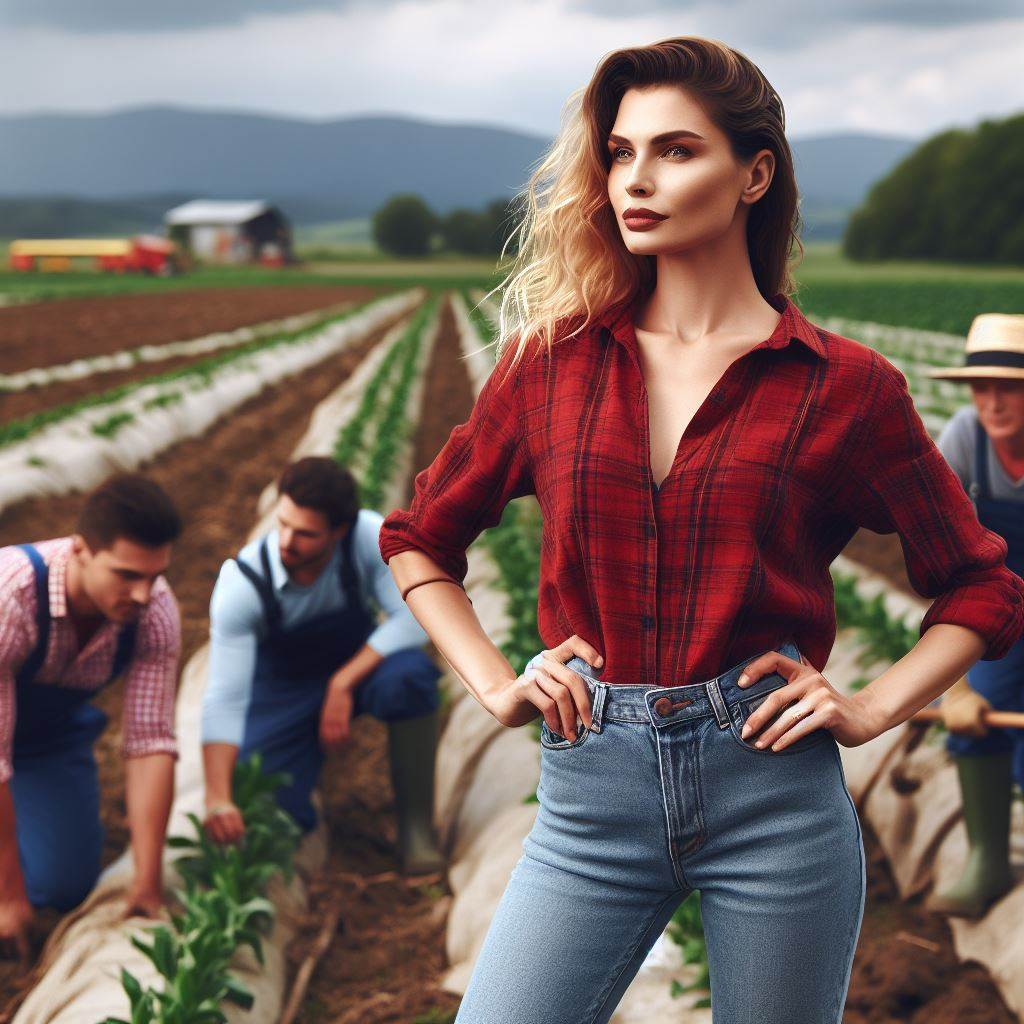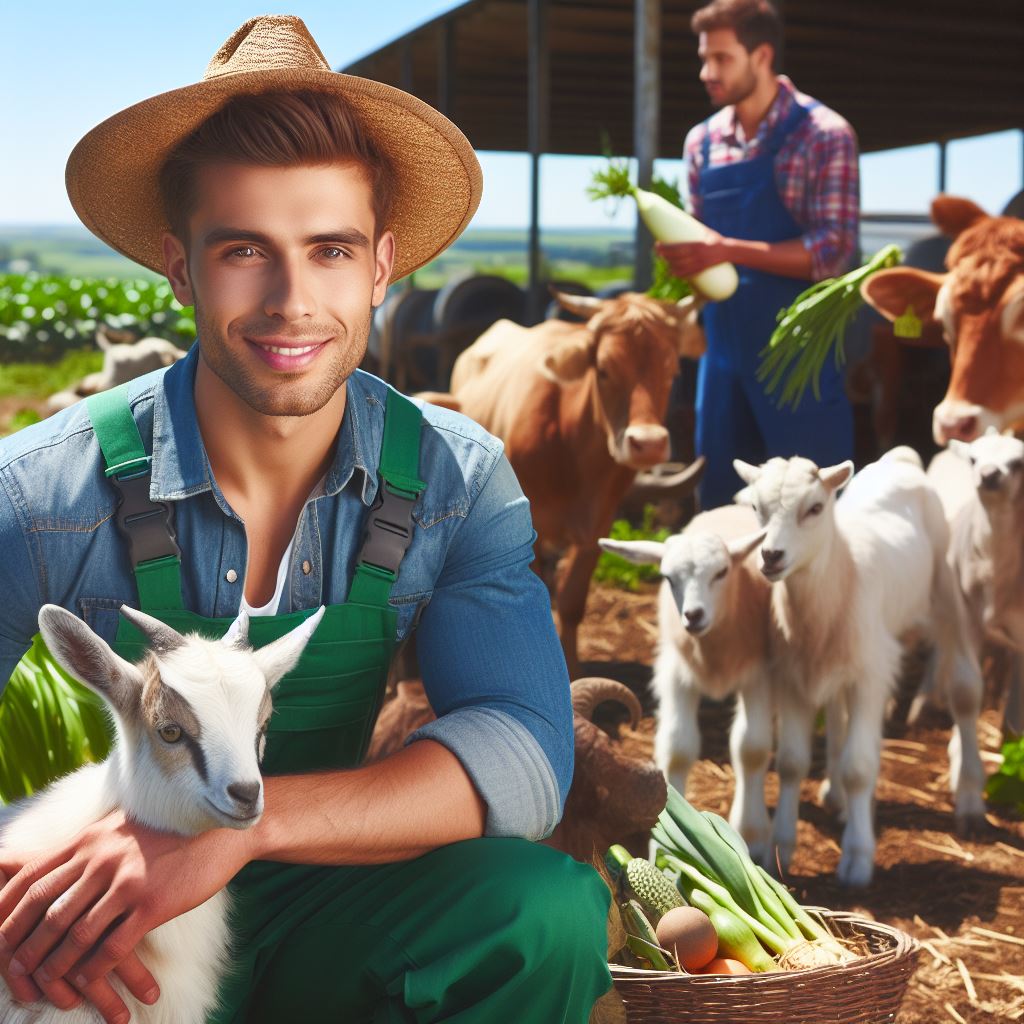Introduction
Millennials, also known as Generation Y, are a group of young farmers who were born between the early 1980s and the mid-1990s.
They bring a fresh perspective to the field of agriculture and are redefining traditional farming practices.
Importance of millennial farmers in modern agriculture
The importance of millennial farmers in modern agriculture cannot be underestimated. Unlike their predecessors, they are well-versed in technology and use it to their advantage on the farm.
From drones for crop monitoring to precision farming techniques, millennials are utilizing innovative tools to streamline operations and increase productivity.
Moreover, they are more likely to embrace sustainable and environmentally friendly practices, contributing to a more sustainable future for agriculture.
The purpose of this blog post is to shed light on the significance of millennial farmers in shaping the future of agriculture.
By exploring their unique characteristics and initiatives, we aim to inspire and empower more young individuals to consider a career in farming.
This new era in agriculture holds immense potential to meet the growing demand for food in a sustainable and efficient manner.
Purpose of the blog post
In the upcoming sections of this blog post, we will delve into the specific traits and skills that set millennial farmers apart, as well as highlight successful case studies of young farmers who are making a mark in the industry.
Stay tuned for an insightful journey into the world of millennial farmers, where tradition meets innovation to create a brighter future for agriculture.
Characteristics of millennial farmers
Tech-savvy and digital natives
Millennial farmers are highly adept at using technology and are comfortable with digital tools.
They embrace new farming technologies, such as precision agriculture and automated machinery.
Their ability to optimize resources through data-driven decisions sets them apart from previous generations.
They leverage digital platforms to access farming information, connect with suppliers, and market their products.
Embrace sustainable farming practices
Millennial farmers prioritize sustainable farming practices over conventional methods.
Transform Your Agribusiness
Unlock your farm's potential with expert advice tailored to your needs. Get actionable steps that drive real results.
Get StartedThey implement organic farming techniques, minimize the use of chemicals, and focus on soil health.
By implementing crop rotation and cover crops, they enhance soil fertility and prevent erosion.
Water conservation and efficient irrigation systems are also central to their sustainable approach.
Entrepreneurial mindset
Millennial farmers have a strong entrepreneurial mindset, seeking innovative ways to improve profitability.
They diversify their operations by exploring new market niches, such as organic or specialty crops.
By actively participating in farmers markets, CSAs, and online platforms, they build direct consumer relationships.
They constantly seek opportunities for value addition, such as processing and packaging their farm produce.
Desire for work-life balance
Unlike previous generations, millennial farmers prioritize work-life balance and personal well-being.
They strive to integrate leisure time, family commitments, and hobbies into their farming routines.
By adopting efficient farm management systems and optimizing workflow, they achieve greater work efficiency.
This allows them to enjoy quality time outside the farm and maintain a healthy lifestyle.
Focus on social and environmental impact
Millennial farmers are driven by a strong sense of social and environmental responsibility.
They prioritize sustainable practices that minimize harm to the ecosystem and surrounding communities.
By establishing partnerships with local organizations and participating in community events, they foster positive change.
Their focus extends beyond profit, aiming to create a lasting and positive impact on society and the environment.
In general, millennial farmers possess distinct characteristics that set them apart in the agricultural industry.
Their tech-savvy nature, embrace of sustainable practices, entrepreneurial mindset, desire for work-life balance, and focus on social and environmental impact make them a new breed of farmers.
These characteristics enable them to navigate the challenges of modern agriculture while fostering innovation and positive change.
As the agricultural landscape evolves, it is clear that millennial farmers play a crucial role in shaping the future of farming.
Read: Aquaponics in Action: Small Scale Farming
Challenges faced by millennial farmers
Limited access to capital and land
Millennial farmers often struggle with obtaining financial resources and investment capital.
They face difficulties in securing loans from traditional financial institutions due to limited credit history.
Access to land is another challenge as it is expensive and often owned by larger corporations or older generations.
These limitations make it harder for millennial farmers to establish and expand their agricultural operations.
Showcase Your Farming Business
Publish your professional farming services profile on our blog for a one-time fee of $200 and reach a dedicated audience of farmers and agribusiness owners.
Publish Your ProfileAlternative funding options like crowdfunding and cooperative farming are being explored to overcome this challenge.
Lack of experience and knowledge
Many millennial farmers do not come from an agricultural background, leading to a lack of experience.
They may lack the necessary skills and knowledge required to efficiently manage their farm operations.
Technology and innovation in farming practices can be daunting for those unfamiliar with this rapidly changing industry.
Efforts are being made to bridge this knowledge gap through training programs and mentorship opportunities.
Collaboration with experienced farmers and agricultural agencies can also help mitigate this challenge.
Changing climate and its impact on farming
Modern farmers face the reality of climate change and its unpredictable impact on their crops and livestock.
Rising temperatures, droughts, floods, and extreme weather events pose significant challenges for agricultural productivity.
Millennial farmers must adapt to changing conditions by improving water conservation techniques and implementing precision farming.
Investing in climate-resilient crops and utilizing climate data and forecasting tools can help mitigate these challenges.
Collaborative efforts among farmers, scientists, and policymakers are crucial in addressing climate change in agriculture.
Market competition and consolidation
Millennial farmers face intense competition from larger farming operations and corporate agriculture.
Consolidation in the agriculture industry has led to monopolies and reduced market opportunities for smaller-scale farmers.
Lack of access to distribution channels and direct markets poses a challenge for millennial farmers to reach consumers.
However, there is a growing consumer demand for locally sourced and sustainable produce, creating niche market opportunities.
Diversifying products, direct-to-consumer sales, and digital marketing can help millennial farmers overcome market challenges.
In essence, millennial farmers face various challenges in today’s agriculture industry.
Limited access to capital and land, lack of experience and knowledge, changing climate conditions, and market competition are among the key hurdles they encounter.
However, efforts are being made to address these challenges through innovative approaches, training programs, collaborations, and market diversification.
By finding solutions to these obstacles, millennial farmers can pave the way for a more sustainable and progressive era in agriculture.
Read: Artisan Cheese: Small Farm Success Story
Opportunities for millennial farmers
Technological advancements and precision farming
Millennial farmers have the advantage of using cutting-edge technologies to optimize their farming practices.
With the help of drones, GPS tracking, and data analytics, they can increase productivity, minimize resource wastage, and reduce environmental impact.
Precision farming techniques allow them to analyze soil and weather conditions, enabling them to make informed decisions and apply resources efficiently.
Global demand for organic and local produce
As millennials become more health-conscious and environmentally aware, the demand for organic and local produce is on the rise.
Millennial farmers can tap into this lucrative market by adopting sustainable farming methods and obtaining organic certifications.
They can also take advantage of e-commerce platforms to connect directly with consumers, bypassing traditional distribution channels.
Rising consumer interest in sustainable farming
Consumers are increasingly concerned about where their food comes from and how it is produced.
Millennial farmers, with their focus on sustainability and regenerative agriculture, can capture the attention of these conscious consumers.
By implementing farming practices that prioritize soil health, biodiversity, and minimizing chemical inputs, they can meet the growing demand for sustainably produced food.
Collaboration and support from agricultural organizations and government
Millennial farmers can benefit from collaboration and support from various agricultural organizations and government initiatives.
There are grants, loans, and educational programs specifically designed to empower and encourage young farmers to enter the industry.
They can also join farmer networks and cooperatives, which provide mentorship, technical assistance, and marketing support.
By working together with these stakeholders, millennial farmers can overcome challenges and access resources that will help them succeed.
In summary, millennial farmers have an array of opportunities available to them in the modern agricultural landscape.
Technological advancements, global demand for organic produce, rising consumer interest in sustainable farming, and collaboration with agricultural organizations and government all contribute to a promising future for millennial farmers.
With their passion, innovation, and commitment to sustainable practices, they have the potential to revolutionize agriculture and contribute to a more sustainable and food-secure world.
Read: Veteran to Farmer: A Tale of Transition

Discover More: Heritage Crops: A Farmer’s Preservation
Strategies for success as a millennial farmer
Continuous education and skill development
- Enroll in courses or workshops to learn about the latest agricultural techniques and technologies.
- Stay updated with industry trends and research to improve farming practices.
- Attend conferences and seminars to network with other farmers and gain knowledge.
- Invest time in reading books, articles, and blogs related to agriculture and farming.
Building strong networks and partnerships
- Join local farming associations and organizations to connect with fellow farmers.
- Collaborate with neighboring farms to share resources and knowledge.
- Attend agricultural trade shows and exhibitions to meet potential partners and suppliers.
- Participate in community events to build relationships with consumers and local businesses.
Leveraging social media and e-commerce platforms
- Create a strong online presence through social media platforms like Facebook, Instagram, and Twitter.
- Share updates about your farm, products, and farming practices to engage with customers.
- Utilize e-commerce platforms to sell your farm products directly to consumers.
- Collaborate with influencers or bloggers in the agricultural industry to increase visibility.
Diversification of farming practices and products
- Explore different types of farming, such as organic farming, hydroponics, or vertical farming.
- Introduce new crops or livestock that have high market demand.
- Offer value-added products like processed foods, jams, or handcrafted items.
- Adopt sustainable farming practices to attract environmentally conscious consumers.
By implementing these strategies, millennial farmers can set themselves up for success in the dynamic agricultural landscape.
Showcase Your Farming Business
Publish your professional farming services profile on our blog for a one-time fee of $200 and reach a dedicated audience of farmers and agribusiness owners.
Publish Your ProfileContinuous education and skill development ensure that they stay ahead of industry changes and adapt to new challenges.
Building strong networks and partnerships not only provides support but also opens doors to new opportunities.
Leveraging social media and e-commerce platforms allows millennial farmers to reach a wider audience and connect directly with customers.
Lastly, diversifying farming practices and products enables them to cater to evolving market demands and maintain a competitive edge.
Read: Eco-Friendly Farming: One Family’s Path
Case studies of successful millennial farmers
John Smith: Utilizing vertical farming techniques
John Smith, a millennial farmer, has embraced the concept of vertical farming to revolutionize agriculture.
He grows crops in vertically stacked layers, using hydroponics and aeroponics systems.
This sustainable approach allows him to maximize productivity in limited space.
By utilizing vertical farming, John is able to cultivate a wide variety of produce year-round, regardless of geographical limitations.
His urban farm is equipped with state-of-the-art technology, including LED lights and climate control systems to create an optimal environment for plant growth.
Through his innovative farming techniques, John has been able to reduce water consumption by up to 90% compared to traditional farming methods.
This not only conserves a precious resource but also minimizes the environmental impact associated with agriculture.
Furthermore, John has established partnerships with local restaurants, grocery stores, and farmers markets to ensure his produce reaches consumers directly.
By cutting out middlemen, he is able to offer fresher, higher-quality produce at competitive prices.
Jessica Nguyen: Organic farming and direct-to-consumer sales
Jessica Nguyen, another successful millennial farmer, is passionate about organic farming and direct-to-consumer sales.
She believes in providing consumers with chemical-free, nutritious produce while maintaining a personal connection with her customers.
Jessica’s farm practices sustainable agriculture methods, using organic fertilizers and natural pest control techniques.
She avoids synthetic pesticides and genetically modified organisms, ensuring that her produce meets stringent organic standards.
By selling directly to consumers through farmers markets and community-supported agriculture (CSA) programs, Jessica establishes trust, transparency, and a loyal customer base.
Through these channels, she is able to educate consumers about the advantages of organic farming and promote a healthy lifestyle.
She also offers farm visits and organizes workshops to engage the community and spread awareness about sustainable farming practices.
This direct interaction with consumers allows Jessica to receive immediate feedback, adapt to their preferences, and cultivate long-lasting relationships.
Ryan Patel: Leveraging e-commerce to reach wider markets
Ryan Patel, a tech-savvy millennial farmer, recognizes the potential of e-commerce in reaching wider markets.
He has created an online platform where customers can browse and purchase his farm’s products, offering convenience and accessibility.
Through his e-commerce website, Ryan is able to reach customers across different geographical locations, eliminating the limitations imposed by traditional brick-and-mortar stores.
He ensures the timely delivery of fresh produce by partnering with reliable shipping companies.
Additionally, Ryan leverages social media platforms to showcase his farm’s practices and engage with his target audience.
He shares captivating images and videos that highlight the farm-to-table journey, fostering a deeper connection between consumers and their food source.
To further expand his business reach, Ryan collaborates with other like-minded farms to create a collective brand.
This allows him to tap into a larger customer base and offer a wider range of products, catering to diverse consumer preferences.
Overall, these case studies of successful millennial farmers exemplify the innovative approaches they have adopted in agriculture.
Whether it’s through vertical farming, organic practices, or e-commerce, they have embraced technology, sustainability, and direct consumer interaction to thrive in the new era of farming.
Conclusion
Recap of millennial farmers’ characteristics and challenges
Ultimately, millennial farmers have brought fresh perspectives and innovation to the agricultural industry.
With their tech-savviness and entrepreneurial spirit, they have embraced sustainable farming practices and are redefining the future of agriculture.
However, they also face numerous challenges, including limited access to land, high startup costs, and a changing climate.
Despite these obstacles, millennial farmers play a crucial role in ensuring sustainable agriculture.
They understand the need to protect the environment, conserve resources, and adopt modern technologies to maximize efficiency.
By implementing sustainable practices, they can minimize the use of harmful chemicals, reduce waste, and promote biodiversity.
The importance of millennial farmers for sustainable agriculture
It is essential to acknowledge the importance of millennial farmers and provide support for their endeavors.
Governments, organizations, and consumers can contribute by offering financial assistance, mentorship programs, and educational resources to help them overcome obstacles.
Showcase Your Farming Business
Publish your professional farming services profile on our blog for a one-time fee of $200 and reach a dedicated audience of farmers and agribusiness owners.
Publish Your ProfileEncouragement for further discussion and support for the new era of agriculture
Additionally, consumers can support them by choosing locally grown produce, which helps sustain small-scale farming operations.
All in all, let’s continue the dialogue about millennial farmers and their impact on agriculture.
By showcasing their achievements, sharing success stories, and discussing their challenges openly, we can inspire others to join the movement.
Together, we can build a brighter and more sustainable future for agriculture, where millennial farmers play a leading role.




